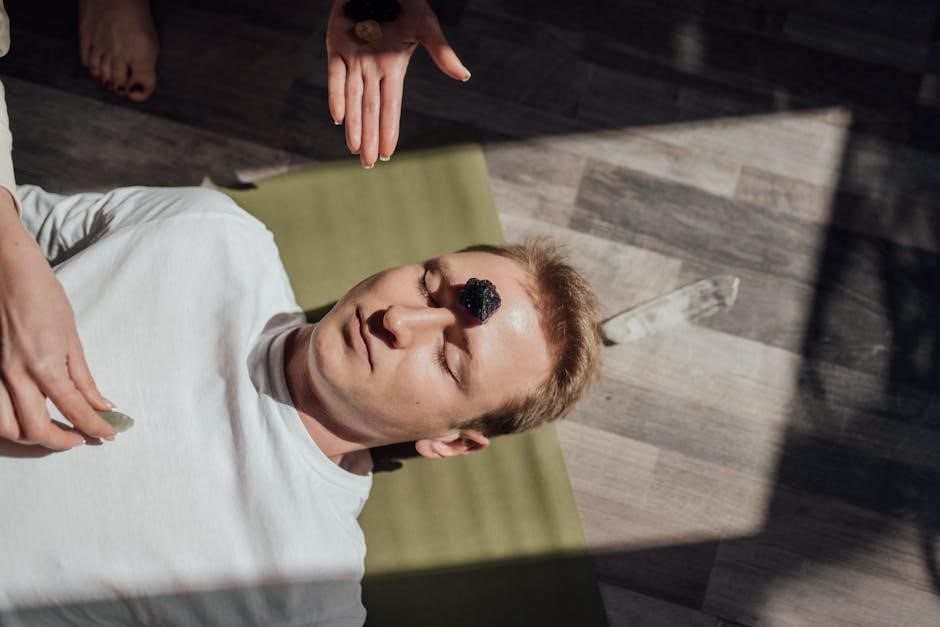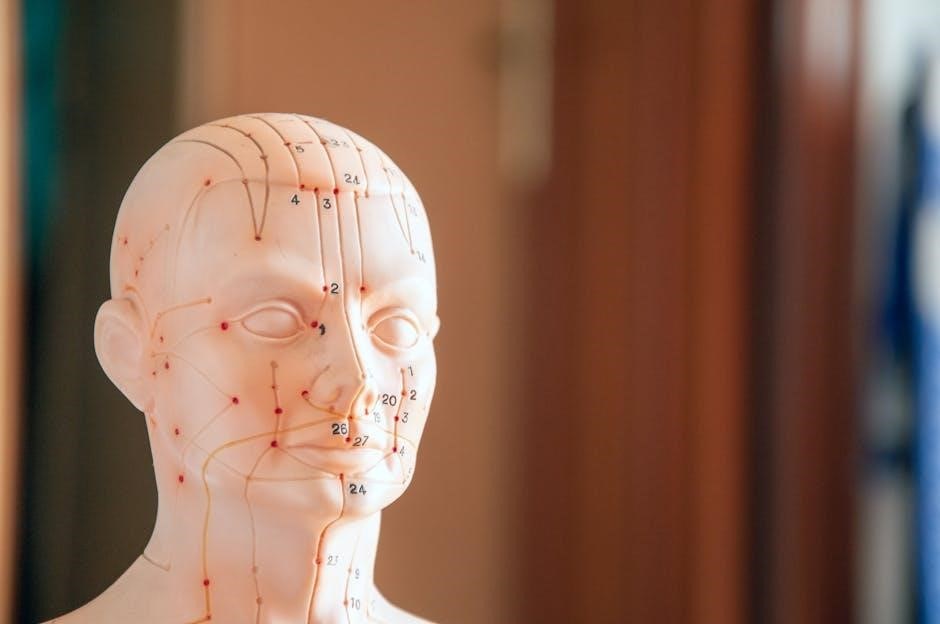
Gestalt therapy is a humanistic, experiential approach emphasizing personal responsibility, present-moment awareness, and the integration of thoughts, feelings, and actions․ Developed as a revision of psychoanalysis, it focuses on the therapeutic relationship and holistic understanding, helping individuals gain self-awareness and emotional regulation through techniques like the Empty Chair Exercise and mindfulness practices․
Definition of Gestalt Therapy
Gestalt therapy is a form of psychotherapy that emphasizes personal responsibility, present-moment awareness, and the integration of thoughts, feelings, and actions․ It is a humanistic and experiential approach that focuses on the therapeutic relationship and the client’s immediate experience․ Gestalt therapy views individuals as wholes, rejecting the division of mind, body, and soul․ It aims to enhance self-awareness, emotional regulation, and the ability to live authentically․ By exploring the “here-and-now,” Gestalt therapy helps clients understand how they interact with their environment and process unresolved emotions․ Its goal is to foster personal growth and self-acceptance, enabling individuals to lead more fulfilling lives․
Origins and Development of Gestalt Therapy
Gestalt therapy emerged in the 1940s, developed by Fritz Perls, Paul Goodman, and Ralph Hefferline, as a revision of psychoanalysis․ It evolved into a distinct, holistic approach, emphasizing the present moment and the client’s immediate experience․ The term “Gestalt” comes from German, meaning “form” or “shape,” reflecting its focus on the whole rather than parts․
The therapy integrated existential and humanistic principles, rejecting traditional psychoanalytic techniques․ It focused on awareness, personal responsibility, and the therapeutic relationship, becoming a unique blend of psychological theories and practices․ This approach continues to evolve, offering a dynamic and client-centered method for personal growth and self-awareness․

Core Principles of Gestalt Therapy
Gestalt therapy focuses on here-and-now awareness, personal responsibility, and a holistic view of human experience, emphasizing the integration of thoughts, feelings, and actions in the present moment․
Here-and-Now Awareness
Here-and-now awareness is a cornerstone of Gestalt therapy, focusing on the present moment rather than past events or future anxieties․ This principle encourages clients to engage fully with their current thoughts, emotions, and bodily sensations․ By concentrating on the immediate experience, individuals can gain deeper insights into their feelings and behaviors․ Techniques like mindfulness and direct observation help clients connect with their authentic selves, fostering a greater sense of awareness and self-understanding․ This approach contrasts with other therapies that may emphasize historical analysis, instead promoting personal growth through immediate, lived experience․
Holistic Approach to Human Experience
Gestalt therapy adopts a holistic approach, viewing individuals as unified systems where thoughts, feelings, and actions are deeply interconnected․ This perspective rejects the fragmentation of mind and body, instead emphasizing the integration of all aspects of human experience․ By focusing on the whole person, Gestalt therapy addresses the interconnectedness of emotional, cognitive, and physical processes․ This approach encourages clients to explore their experiences within the present moment, fostering a comprehensive understanding of themselves․ The holistic nature of Gestalt therapy allows for a more nuanced and integrated process of personal growth and healing, addressing the individual as a cohesive, dynamic system․
Personal Responsibility and Self-Awareness
Gestalt therapy emphasizes personal responsibility, encouraging clients to take ownership of their thoughts, feelings, and actions․ This approach fosters self-awareness, helping individuals recognize and accept their role in shaping their experiences․ By focusing on the present moment, clients gain insight into their choices and behaviors, promoting a sense of agency․ The therapeutic relationship is a partnership, with the therapist guiding the client to explore their awareness and embrace accountability․ This process empowers individuals to move beyond blame or passivity, instead cultivating authenticity and self-directed growth․ Through increased self-awareness, clients develop the tools to navigate life’s challenges with greater clarity and responsibility․

Key Techniques in Gestalt Therapy
Key techniques in Gestalt Therapy include the Empty Chair Exercise, Role-Playing, and Mindfulness․ These methods facilitate emotional exploration, behavioral experimentation, and present-moment focus, enhancing self-awareness and emotional regulation․
The Empty Chair Exercise
The Empty Chair Exercise is a powerful Gestalt technique used to explore unresolved emotions, often toward someone not present․ Clients imagine the person in an empty chair and express their feelings, fostering self-awareness and emotional resolution․ This role-playing method allows individuals to process conflicts, gain insight, and develop a deeper understanding of their emotions․ By engaging with the “other” in the chair, clients can confront and heal from past wounds, enhancing their ability to manage emotions and improve relationships․ This experiential approach is a cornerstone of Gestalt therapy, promoting authenticity and personal growth through direct, present-moment interaction․
Role-Playing and Experimentation
Role-playing and experimentation are dynamic Gestalt techniques that encourage clients to explore emotions, behaviors, and relationships in a safe, creative environment․ These methods allow individuals to step into different roles or scenarios, fostering self-discovery and emotional expression․ By experimenting with new ways of being or interacting, clients can gain insights into unresolved conflicts and practice healthier responses․ These techniques promote authenticity and spontaneity, helping individuals break free from rigid patterns and develop greater self-awareness․ Through active engagement, clients can experience personal growth and develop more fulfilling ways of connecting with others, aligning with Gestalt therapy’s focus on present-moment awareness and holistic understanding․
Mindfulness and Present-Moment Focus
Mindfulness and present-moment focus are cornerstone techniques in Gestalt therapy, emphasizing awareness of the here-and-now experience․ By encouraging clients to engage fully with their current thoughts, feelings, and bodily sensations, mindfulness helps individuals break free from distractions and connect deeply with their immediate reality․ This practice fosters self-awareness, emotional regulation, and a heightened sense of authenticity․ Gestalt therapists guide clients to observe their experiences without judgment, allowing for greater insight into patterns and unresolved issues․ Techniques such as focusing on breath or bodily sensations anchor clients in the present, promoting clarity and emotional healing․ This approach empowers individuals to live more consciously and respond to life with greater intention and awareness․

The Role of the Therapist in Gestalt Therapy
The therapist acts as a guide, fostering awareness and insight while maintaining a non-judgmental, supportive attitude․ They facilitate exploration of the present moment, empowering clients to take responsibility for their experiences and growth․
The Therapist as a Guide, Not a Director
In Gestalt therapy, the therapist’s role is to guide rather than direct․ They create a supportive environment where clients explore their experiences without imposition․ The therapist avoids giving advice or making decisions for the client, instead focusing on helping them discover their own insights and solutions․ This approach emphasizes collaboration, encouraging clients to take ownership of their growth and healing․ By fostering awareness and self-directed learning, the therapist empowers clients to integrate new perspectives and achieve meaningful change in their lives․
Facilitating Awareness and Insight
Gestalt therapists facilitate awareness and insight by helping clients focus on their immediate experiences․ Through present-moment exploration, clients gain clarity on their thoughts, feelings, and bodily sensations․ The therapist encourages self-reflection and experimentation, enabling clients to uncover patterns and meanings they may not have previously acknowledged․ By exploring these insights, clients develop a deeper understanding of themselves and their experiences․ This process fosters personal growth and empowers clients to make informed decisions about their lives․ The therapist’s role is to support this journey of discovery, ensuring clients feel safe and guided as they navigate their inner world․
Maintaining a Non-Judgmental and Supportive Attitude
In Gestalt therapy, maintaining a non-judgmental and supportive attitude is essential for fostering a safe and trusting therapeutic relationship․ The therapist avoids imposing preconceived notions or interpretations, instead embracing the client’s unique experience without criticism․ This approach encourages clients to explore their thoughts, emotions, and behaviors openly․ By remaining empathetic and accepting, the therapist creates an environment where clients feel empowered to confront and understand their challenges․ This supportive stance allows clients to process their experiences authentically, promoting self-awareness and personal growth․ The therapist’s non-judgmental attitude is a cornerstone of Gestalt therapy, enabling clients to engage deeply with their inner worlds․

Benefits of Gestalt Therapy
Gestalt therapy fosters increased self-awareness, emotional regulation, and personal growth․ It enhances holistic integration of thoughts, feelings, and actions, promoting improved mental and emotional well-being through mindfulness․
Increased Self-Awareness and Emotional Regulation
Gestalt therapy enhances self-awareness by focusing on the present moment, helping individuals recognize and process their thoughts, feelings, and bodily sensations without judgment․ This awareness fosters emotional regulation, allowing clients to manage stress and respond to challenges more effectively․ Techniques like mindfulness and the Empty Chair Exercise enable clients to explore unresolved emotions and gain insight into their experiences․ By integrating fragmented aspects of the self, Gestalt therapy promotes emotional balance, resilience, and a deeper understanding of one’s needs and motivations․ This increased self-awareness and emotional regulation empower individuals to navigate life’s challenges with greater clarity and confidence․

Case Studies and Real-Life Applications
A client struggling with unresolved anger toward a parent used the Empty Chair Exercise, leading to greater insight and emotional resolution, demonstrating Gestalt techniques’ practical effectiveness․
Using Gestalt Techniques in Practice
Gestalt techniques are applied in therapy to enhance clients’ awareness and emotional processing․ The Empty Chair Exercise allows clients to confront unresolved issues by imagining a conversation with an absent person․ Role-playing helps explore different perspectives and emotions, fostering deeper self-understanding․ Mindfulness practices encourage clients to focus on the present moment, reducing distractions and increasing self-awareness․ These methods empower individuals to integrate fragmented thoughts and feelings, promoting holistic healing and personal growth․ By engaging in these exercises, clients gain insight into their experiences and develop healthier ways to manage emotions and relationships, leading to lasting emotional resolution and self-awareness․

Training and Resources for Gestalt Therapy
Recommended readings include Gestalt Therapy: 100 Key Points & Techniques and Gestalt Therapy: Perspectives and Applications․ Workshops and certification programs offer hands-on training and practical experience․
Recommended Reading and PDF Resources
Key resources for studying Gestalt therapy include Gestalt Therapy: 100 Key Points & Techniques and Gestalt Therapy: Perspectives and Applications․ These texts provide a comprehensive understanding of the theory and practice, covering essential techniques like the Empty Chair Exercise․ PDF guides, such as introductory overviews from the Gestalt Therapy Association, offer accessible summaries for both professionals and newcomers․ Additionally, numerous academic articles and case studies are available online, detailing real-world applications and contemporary advancements in Gestalt therapy․ These resources are invaluable for deepening knowledge and enhancing practical skills in this dynamic therapeutic approach․
Workshops and Certification Programs
Workshops and certification programs in Gestalt therapy offer in-depth training for mental health professionals․ These programs often include intensive, hands-on sessions focusing on core techniques like role-playing, mindfulness, and the Empty Chair Exercise․ Many workshops are designed to enhance practitioners’ skills in fostering here-and-now awareness and facilitating emotional insight․ Advanced programs may explore specialized topics, such as trauma-informed Gestalt practices or integrating Gestalt principles into group therapy․ Certification programs typically require completion of theoretical and practical modules, ensuring a comprehensive understanding of Gestalt therapy’s humanistic approach․ These resources are essential for therapists seeking to master Gestalt techniques and apply them effectively in clinical settings․
Gestalt therapy offers a powerful, present-focused approach to personal growth and healing․ By emphasizing awareness, responsibility, and the integration of mind and body, it provides a holistic framework for understanding and addressing emotional challenges․ Its techniques, such as the Empty Chair Exercise and mindfulness practices, empower individuals to explore their experiences in the here-and-now․ With a strong emphasis on the therapeutic relationship, Gestalt therapy fosters a supportive environment for self-discovery and change․ As a dynamic and adaptable form of psychotherapy, Gestalt continues to evolve, offering profound insights and practical tools for those seeking greater self-awareness and emotional well-being․